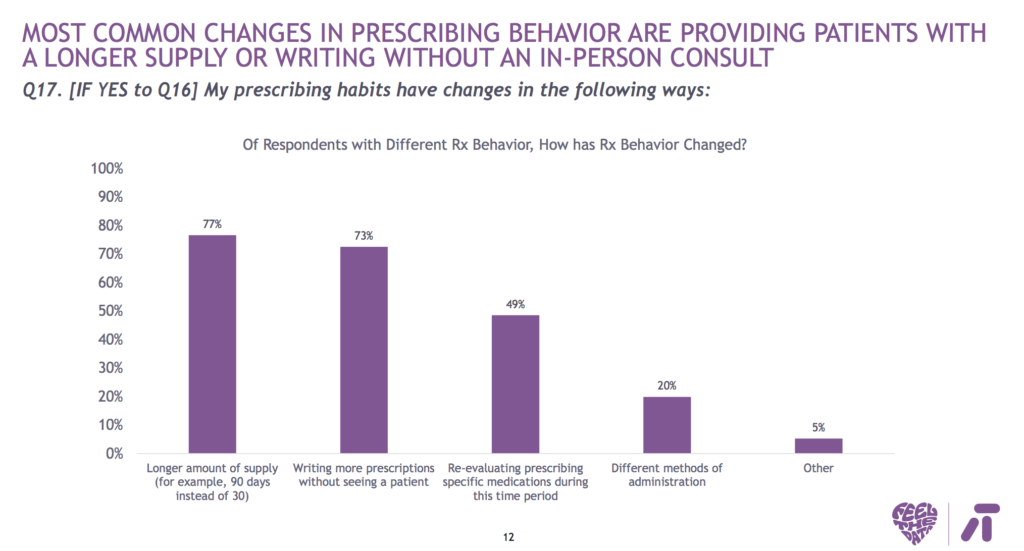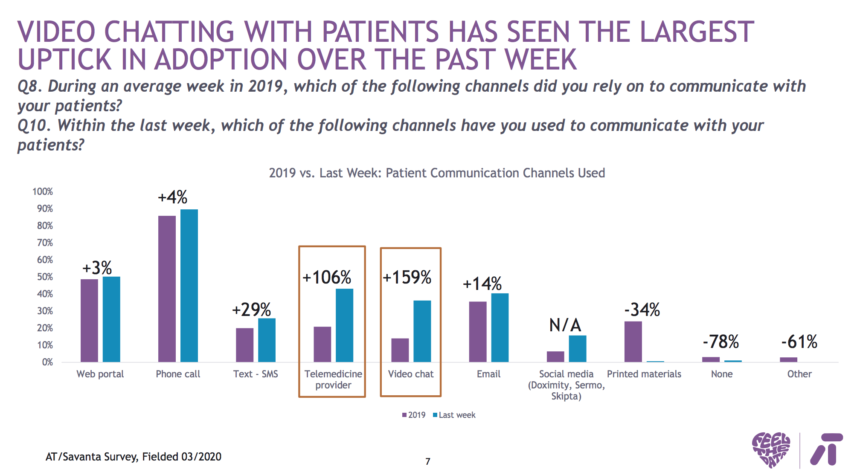To better understand how physicians are responding to the tectonic changes prompted by the coronavirus crisis – the virtualization of routine visits, the longer hours and the threats to their physical and mental well-being, among others – AbelsonTaylor surveyed 500 physicians with an average practice tenure of 17 years. The survey results, compiled in “Understanding Physician Engagements in a COVID-19 Impacted World,” revealed an equally tectonic shift in both their behaviors and practices.
Nearly 40% of respondents have changed their prescribing habits, including writing longer supplies or prescribing treatments without an in-person consultation. Three out of four doctors have increased their use of alternative methods to communicate with patients, with telemedicine services (106%) and video chat (159%) experiencing the biggest jumps in usage.
AbelsonTaylor’s senior director of marketing intelligence Amanda Hartzmark said the study shines a light on opportunities and responsibilities for physicians amid the crisis. “If, for example, patients are going from a 30-day to a 90-day supply, they may not be checking in with their HCP or speaking to a pharmacist as often as they previously would,” she explained. “There are touchpoints that some pharma partners could put in to ensure patients are adhering to and following through on treatments to manage their own health.”
When it comes to hearing from pharma, respondents reported that they’re receiving fewer patient support materials than usual. More than 80% said they did not receive any new materials during the past week. They added that visits from sales reps – not just in-person, but in the form of tele-details and e-details – dropped 63%.

AbelsonTaylor also supplemented the survey with real-world data from Veeva. That data showed that face-to-face meetings fell more than 50% while emails jumped 263% between January 2020 and March 2020, following similar trends found in the AbelsonTaylor’s survey. Both findings stress the importance of digital sales and marketing material for HCPs.
The respondents were clear about the type of information they want from pharma: Treatment protocols for COVID-19 patients, with 42% of doctors asking for such materials.
“We were surprised that most physicians have not received new material from pharma partners to help them through this current moment,” Hartzmark said. “They want to hear from their partners on that and are interested in finding out what the treatment protocol would be for someone on a certain product and diagnosed with COVID-19… It’s a digital touchpoint that they want.”
One digital touchpoint in which respondents expressed little interest were virtual events. Hartzmark attributed this to the current workload of most physicians, noting that few have the time to spare for a 60- or 90-minute-long online event. She added that virtual events tend to lack the prized networking opportunities and camaraderie of in-person assemblies.
Hartzmark nonetheless said that physicians still want “that quick-hit of information” and that they remain extremely open to communicating with peers and pharma alike. “For people who are caught up in this crisis, like general practitioners, being able to share tips and best practices with peers, or even just venting about the situation they’re facing, is important. Many thought [virtual events] would be the next step and that everything would go online, but pharma partners have to create opportunities to build camaraderie.”
Has your company done something extraordinary for others amid the COVID-19 pandemic? If so, we want to hear about it. Send a few paragraphs, along with photos or graphics if available, to MM&M’s Larry Dobrow. We’ll publish some of the responses on our website.







